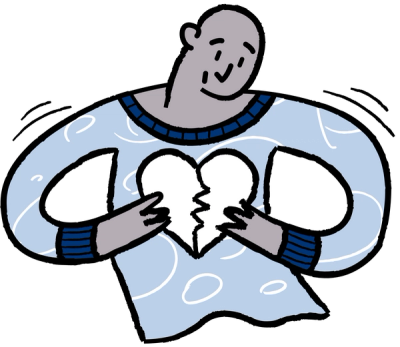What suicidality feels like and how it can affect me?
When it comes to suicidal thoughts, no two people’s experience will be exactly the same, because what you feel and how it affects you is influenced by your personal circumstances and past experiences.
Some people might have thoughts of suicide that stick around, while others feel the urge to act on it suddenly. You might feel like there's no hope, or really sad and scared, while others might have different feelings, like anger, and feeling trapped.
Feelings
It's common to feel overwhelmed and distressed when experiencing thoughts of suicide. These feelings can be intense and may seem impossible to overcome. However, it's important to remember that you are not alone in this struggle. Many people experience thoughts of suicide at some point in their lives, and there is help and support available.
- Feelings you might experience if you're suicidal
- Despair: You may feel like your problems are impossible to solve, and that there is no way out of your current situation.
- Emotional pain: You may be experiencing intense emotional pain. This pain can take many forms, such as sadness, anger, or anxiety, and you may feel your emotions are too much to handle and you cannot cope.
- Isolation and loneliness: You may feel like you're the only one going through your struggles, that nobody understands or cares about what you're going through. It may feel like you have nobody to talk to.
- Burdensomeness: The weight of your problems may cause you to feel like a burden on those closest to you, or on society as a whole. You may worry that your struggles are too much for others to handle, and that you’re causing more harm than good.
- Helplessness: You may feel that you are powerless or have no clear way to change your circumstances and that nothing and no one can help.
- Worthlessness: You may believe you have no value as a person, that you are inadequate, or that your life has no meaning. You may struggle to see your positive qualities and strengths.
- Shame and guilt: You may feel ashamed or guilty about your thoughts and feelings. You may feel like you’re weak or have failed in some way and may experience feelings of self-hatred as a result. You may blame yourself for your problems and believe that you don't deserve to live.
- Hopelessness: You may feel that there is no hope for your situation to improve. You may feel stuck or trapped in a situation that feels too big to overcome.
- Inability to find meaning or purpose: You may feel like you have lost your sense of purpose or meaning in life, and that you have no reason to continue living.
- Anger: You may feel angry about your situation or about the people or circumstances you believe are causing your distress. You might feel like you have been wronged or betrayed in some way.
- Numbness: You may experience emotional numbness and feel like you have no emotional energy left, and that nothing matters anymore.
- Fear: You may feel afraid about what might happen if you continue living, or if you attempt suicide. You may also feel afraid about seeking help, particularly if you fear being judged or misunderstood
“I was living in the state of perpetual darkness, both inside my soul and in life itself. ”
Feeling suicidal is a sign of significant distress, and it’s important to seek help if you or someone you know is experiencing these emotions. With the right support and treatment, it’s possible to overcome these feelings and achieve a better quality of life.
Remember, seeking help and support is a brave and important step towards healing and recovery. There are many resources available to help you, such as therapy, support groups, and the Lifeline crisis support line.
It's important to reach out and talk to someone you trust about what you're going through, and to know that there is hope for the future. Remember, your life has value and there are people who care about you and want to help you through this difficult time.

Thoughts
When you're feeling suicidal, you might have all sorts of thoughts that can be really tough to handle. These thoughts can make you feel helpless and hopeless, like there's no way out.
- Thoughts you might experience
It’s important to remember that while many other people have reported having these same thoughts when they’re suicidal, they are not accurate. These kinds of thoughts are unhelpful and are your brain's way of trying to make sense of how you’re feeling, and what you’re experiencing. Speaking to a Lifeline Crisis Supporter or to a psychologist can help you process suicidal thoughts and consider other, more helpful perspectives.
“I had intrusive thoughts that were telling me that everyone was just so much better off without me. ”
Effects
Suicidal thoughts can significantly impact your life. They can be really painful, and affect how you feel emotionally, physically, and socially. You might feel like there's no hope and that things will never get better. This can make it hard to reach out for help, which can make you feel worse.
- Ways suicidal thoughts may affect you
Effects on behaviour
If you're having suicidal thoughts, you may begin to behave in ways that are unusual for you. You might avoid being around others, stop doing things you used to like, or do things that are risky and dangerous.
- Some other changes you may notice
One of the signs that someone could have made a decision to take their own life is an extreme mood change. If someone you know is usually depressed or anxious and they seem unusually calm all of a sudden, this can be a major warning sign.
If you have read this list, and you have experienced some of these feelings and thoughts, it can be incredibly challenging and overwhelming. Remember, you are not alone and there are people who want to help you. It's okay to ask for help and support when you need it. Seeking help is a courageous step towards overcoming these difficult emotions and finding a path towards healing. You don't have to suffer in silence or face this alone.
There are many effective treatments available that can help you manage and overcome suicidal thoughts and feelings. With the right support and treatment, it is possible to regain a sense of hope and purpose in life. You deserve to feel safe, loved, and valued, and there are people who can help you achieve that.
Recovery is possible, and it's important to remember there is always hope, even in the darkest moments. You have the strength and resilience to overcome these difficult emotions, and with the right support, you can build a brighter future for yourself.
Download our fact sheets:





